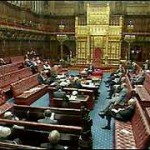 The first vote of the Parliament took place in the Lords yesterday and the Government lost it. It was on a procedural point as to whether the Local Government Bill was a hybrid Bill or not: that is, a public bill that affects private interests different from other interests in the same class. If it is classed as hybrid, it follows a different procedure to that of a public bill.
The first vote of the Parliament took place in the Lords yesterday and the Government lost it. It was on a procedural point as to whether the Local Government Bill was a hybrid Bill or not: that is, a public bill that affects private interests different from other interests in the same class. If it is classed as hybrid, it follows a different procedure to that of a public bill.
The Clerk of Public and Private Bills took the view that the Bill was not hybrid, given that it was a one-clause Bill that was tightly drawn to treat each authority in the same class as the same. (It was a very small class covered by the Bill.) Lord Howarth of Newport had obtained counsel’s opinion as well as the view of a parliamentary agent (lawyers who specialise in private bills) that there was an arguable case that the Bill was hybrid and he therefore moved that the Bill be referred to the Examiners to determine whether it was hybrid. The bar for referral is essentially a low one – if there is doubt, then the matter should be referred to the Examiners (the clerks in the two Houses who deal with private legislation). Though I think the Clerk of Public and Private Bills is correct in his assessment, the element of doubt is what is important.
The House voted to refer the Bill to the Examinars by 154 votes to 150. The Content lobby comprised the Opposition and a very large number of cross-benchers – including three former Cabinet Secretaries, two former Law Lords and the four Bishops who were present. There were also a number of absentions on the Conservative benches.
The passage of the motion meant that Second Reading of the Bill had to be postponed. Once the Examiners have reported, the Bill can then follow the appropriate procedure. It also means that there will no longer be any doubt as to the status of the Bill and thus render it free from further challenge.

I have been waiting eagerly for Lord Norton’s comment on yesterday’s unusual proceedings. He explains what it was about better than I could, who listened with some puzzlement I must confess. It was the first vote in the Lords of the new parliament and took us all rather by surprise. There was definitely an element who voted for the motion to refer the Bill to the Examiners not because of a very serious doubt about the nature of the Bill but because they wished to demonstrate to the Government that together the opposition and the crossbenchers could win a vote against the coalition if united. The crossbenchers are rarely united of course but on this occasion the majority voted with the Labour party. I had a feeling the Tories and Lib Dems had not been whipped as effectively as usual, a lesson the new coalition Government will no doubt quickly remedy.
What real difference does it make depending on which type of bill is it classed. The vote splitting on essentially party lines doesn’t seem so much of an issue of principle but the tired old politics of oppositions voting against governments for the sake of it and loyalists voting for equally poor reasoning. The Labour position seems to be an attempt to frustrate plans to undo their changes to unitary authorities and nothing to do with the type of bill
PS – what’s happening with regard to opposition questions in the house after the fairly farcical recent scenes over denying/letting the LDs ask questions of the minister?
Croft, I agree with you that the fundamental issue here was the Labour party wish not to see their local government changes in Exeter and Norwich reversed, a legitimate wish surely whether one agrees or not. There was some discussion yesterday that the manner in which they opposed, by challenging the form of the bill, was an underhand thing to do, especially as it called into question the judgement of highly experienced clerks, whose judgements are normally respected by the House. There is also the matter of the expense that will be incurred and the delays in making a decision, not good for those waiting to know the future of their local authorities. But the debate about the doubts about the form of the Bill were genuine enough and for many crossbenchers the former Law Lord, Lord Lloyd’s decision to support the motion was persuasive. We could only judge on the merits of what was said in debate. With hindsight I would have liked to know more about the background before voting.